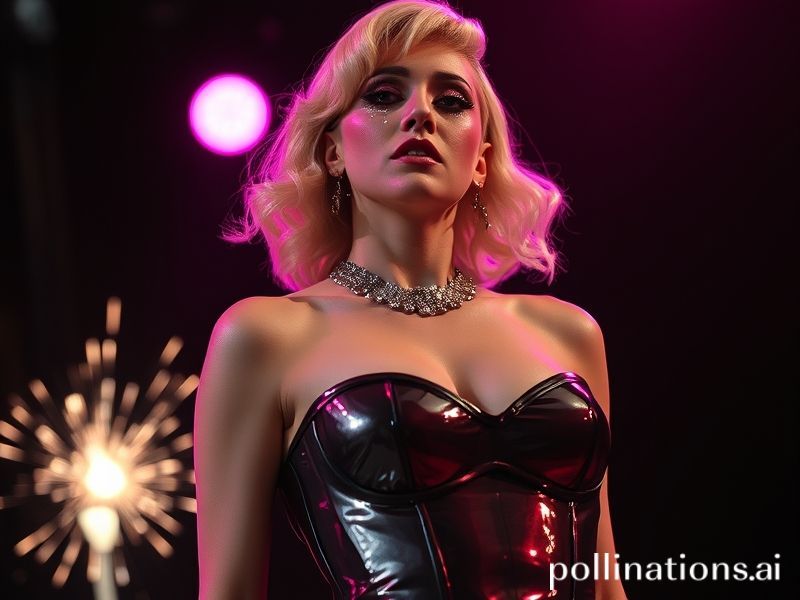Global Gaga: How One Pop Star Became the World’s Most Flamboyant Reserve Currency
In the geopolitical cafeteria of global pop culture, the dish labeled “Lady Gaga” is no mere canapé. It is a full-course, multi-sensory banquet that has been passed from Seoul’s Gangnam clubs to Lagos’s Afro-fusion parties, from Berlin’s Berghain basement to a yacht off Monaco where oligarchs pretend they still care about music. One decade and a half after she sashayed out of New York dive bars wearing caution tape like haute couture, Stefani Joanne Angelina Germanotta has become less a singer than a floating currency—traded, shorted, bundled, and occasionally laundered through perfume lines and limited-edition Oreos. If you think that sounds cynical, congratulations: you’ve just been issued citizenship in the republic of 2024.
Start with the numbers. Roughly 170 million records sold, 13 Grammys, a net worth orbiting half a billion dollars—figures large enough to make the finance ministers of several indebted nations weep softly into their spreadsheets. Yet the raw sales tell only part of the story. In Indonesia, where conservative clerics once tried to cancel her Born This Way tour for “corrupting the youth,” bootleg T-shirts of Gaga in a meat dress now outsell local pop merch three to one. Meanwhile, Japanese convenience stores stock Gaga-branded sake, a beverage that tastes faintly of bubblegum and lost innocence, proving once again that capitalism can metabolize even the most aggressive subversion and sell it back to you chilled at 7-Eleven.
The meat dress itself—worn at the 2010 MTV Video Music Awards—deserves its own diplomatic passport. In Argentina, where beef is both sacred export and political football, left-leaning cartoonists repurposed the image to mock austerity cuts (“We can’t afford bread, but here’s Gaga in flank steak”). In Qatar, where the dress would probably trigger an immediate fatwa, it still circulates on encrypted Telegram channels as a meme about Western excess. One could argue that a slab of flank steak on a pop star’s shoulders has done more for global conversations on consumption ethics than most UN sustainability pamphlets—though, like most UN pamphlets, the follow-through has been negligible.
Gaga’s pivot into acting added another layer of soft power. When she starred in House of Gucci, Italians split into two camps: those who considered her accent an act of war on the Lombard dialect, and those who simply applauded the free tourism bump. The film grossed more in Asia than in North America, proving that nothing sells European aristocratic dysfunction quite like an American woman who once sang about disco sticks. The Oscar campaign was, of course, a masterclass in industrial-grade humility: private jet to Venice, recycled Versai, and a sound bite about “art saving lives” delivered while water taxis ferried influencers past overpriced Aperol spritzes. Somewhere, a Venetian pensioner whose rent tripled during the festival wept into his ombra, but the acoustics of applause drowned him out nicely.
Then there is the philanthropy—an arena where sincerity and brand synergy perform their eternal tango. Gaga’s Born This Way Foundation, armed with flowcharts and corporate partners, promotes youth mental health from Ohio to Uttar Pradesh. Laudable, certainly, though the cynic might note that the same streaming platforms bankrolling her foundation’s PSAs also autoplay “Poker Face” to teenagers at 3 a.m., thereby contributing to the very insomnia the foundation warns against. Still, in a world where billion-dollar companies change their logos to rainbows for Pride month, Gaga at least brings a disco ball to the charade.
And so we arrive at the broader significance. Lady Gaga matters internationally not because she unites us—nothing truly unites us anymore, except perhaps shared bewilderment—but because she offers a common dialect of spectacle. Whether you adore her, despise her, or simply use her as background filler while doom-scrolling, she is a reference point in the same way the dollar is: volatile, occasionally grotesque, yet weirdly indispensable. She is the glittery canary in our cultural coal mine, tweeting through the methane. When the canary finally collapses, we’ll probably just livestream the funeral on TikTok, auction the feathers as NFTs, and queue up “Bad Romance” for the after-party.
In the end, perhaps that is the sickest joke of all: the world burns, democracy hiccups, ice caps file for bankruptcy, and still we find ourselves humming along to a woman who once wore a dress made of Muppets. Gaga promised we were all born superstars. She never specified that the gig pays in exposure, carbon credits, and existential dread. Curtain call.







